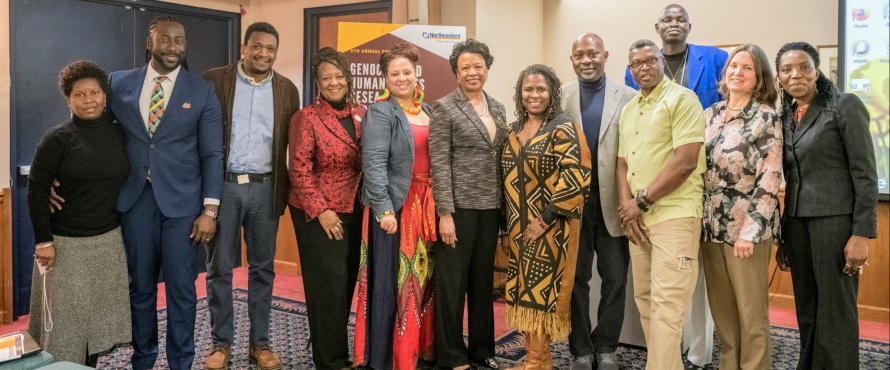Northeastern Illinois University’s GHRAD Center to host 7th annual Genocide and Human Rights in Africa and the Diaspora Conference

Friday, February 5, 2021
Northeastern Illinois University’s Genocide and Human Rights in Africa and the Diaspora (GHRAD) Center will host the 7th annual Genocide and Human Rights in Africa and the Diaspora Conference on Feb. 11-12. It will be streamed on the GHRAD Center website, Zoom and Facebook.
The conference will feature global experts in genocide and human rights, specifically in Africa and the diaspora. This year’s keynote speaker will be Mark Mathabane, author of
The G
“Our annual conference provides a learning opportunity for people from any walk of life to learn about genocide and human rights, areas that are bar
Ntihirageza notes the history of colonialism, violence, and modes of suppression often prevent the injustices taking place to gain the international attention needed to bring them to an end.
“Genocide in Africa and the Diaspora is multilayered and complicated,” Ntihirageza said. “Most of the genocide that happened in Africa started and/or was propagated by colonialists who took charge of defining who is worthy and unworthy of everything —including life. They created superficial identities that have had a long-lasting detrimental impact on the dominated peoples. The power dynamics of silence, memory and displacement are tools for denying or obscuring genocide. That’s why it’s important to hold conferences such as ours, to discuss and draw attention to the fragility of human life in general, and in particular Africa and the diaspora, which includes peoples living here in Chicago and across the U.S.”
Understanding the historical genocide and human rights violations of people in Africa raises awareness of the cont
“The perception of ‘Blackness’ has shaped the response Black people get in many circumstances,” Ntihirageza said. “We see this on a regular basis in interactions Black people have with police. We’ve also seen this in the disproportionate amount of deaths of Black people due to COVID-19. These issues are a continuation of history. The lack of access to resources, the dilapidated environments and communities with no access to healthy food, quality education, and health care,
In addition to the conference, Ntihirageza and two other members of the GHRAD Center research team, Northeastern Professor Chielozona Eze and Alfred Frankowski, professor of Philosophy and director of graduate studies at Southern Illinois University Carbondale, have edited a book that will be released later this month about genocide in Africa. “Critical Perspectives on African Genocide: Memory, Silence and Anti-Black Political Violence” features chapters written by past keynote speakers of Northeastern’s annual conference.
“As scholars, we know how challenging it can be to participate in conferences, especially pre-COVID,” Ntihirageza said. “Until recently, it was almost unheard of that conferences would be held virtually. Yet, the need for people to know and understand how genocide can occur, how it has perpetuated in Africa and the African diaspora, and how African genocide is distinctly different from the genocide that has occurred in Europe or the West is critical to understanding the after-effects of global colonialism, and moving toward a more just, anti-racist society. This is why we put the book together, so this scholarship could be more accessible to more people.”
The book release and virtual conference both are taking place in February, which is recognized as Black History Month in the U.S. Ntihirageza hopes the confluence of these events will help individuals engage in conversations about genocide and human rights in order to create a more compassionate global community.
“With the conference being virtual this year, it gives us the opportunity to engage with audiences we might not otherwise have been able to reach,” Ntihirageza said. “I hope the conference will ignite curiosity about genocide and human rights issues in Africa and the diaspora, particularly by paying attention to the least-known cases. The GHRAD Center team hopes the conference will help develop a sense of compassion and promote efforts for civic engagement and peace-building so that more and more people prevent future genocides from occurring.”
Top photo: Northeastern President Gloria J. Gibson (center) with members of the GHRAD Center staff and research team at the 2019 Genocide and Human Rights in Africa and the Diaspora Conference.